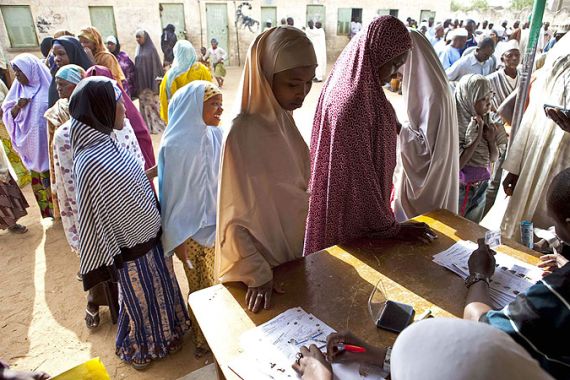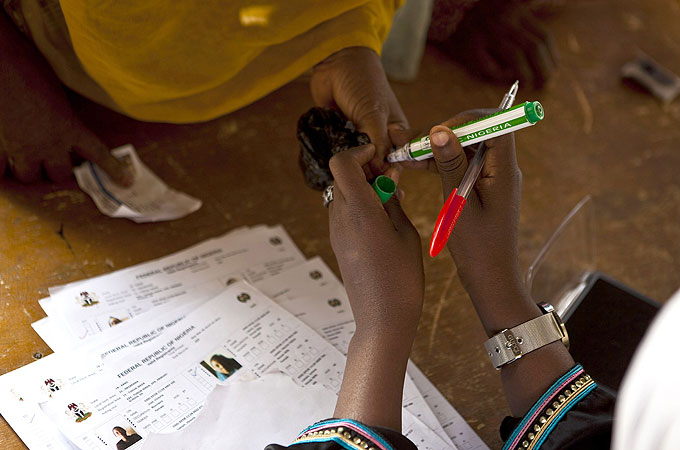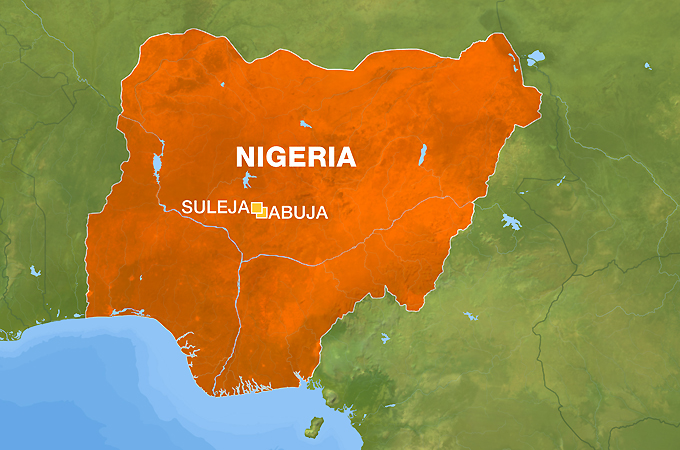Nigeria hit by second blast as polls continue
Official says bomb went off near the city of Maiduguri and caused casualties hours after a deadly blast on election eve.

 |
| An election official inks the thumb of a voter in Nigeria’s parliamentary elections in the northern city of Kano [Reuters] |
A second explosion has hit a polling booth in a neighbourhood of the northeast Nigerian city of Maiduguri, killing three people, only hours after the first blast killed at least eight people on the eve of parliamentary elections, an emergency official said.
Yushua Shuaib, a spokesman for the National Emergency Management Agency (NEMA), said on Saturday the polling station was in the Unguwar Doki neighbourhood and that the attack happened as parliamentary polls got underway.
The first explosion on Friday targeted the independent National Electoral Commission in Suleja, on the northwestern edge of the capital, Abuja. It came after a fatal shooting in Borno state of four people, including an official of the ruling Peoples’ Democratic Party.
Saturday’s parliamentary polls are the first in a string of elections to be held in Nigeria in the month of April. Presidential election is scheduled for next week while voting for governors is to be held on April 26.
From Kano, in the north of the country, Al Jazeera’s Yvonne Ndege said the voter turnout was “absolutely huge”.
There were reports of logistical problems though, with ballot papers being in short supply at several polling centres.
 |
The situation was most worrisome in the troubled Niger Delta region in the south, where there had been reports of violence and the kidnapping of electoral workers, Ndege reported.
In the commercial city, Lagos, the turnout was disappointingly low, Al Jazeera’s Barnaby Phillips reported.
“A credible vote is particularly important to help bolster Nigeria’s stature abroad. Attempts to play a leadership role in the region have been undermined by its own flawed democratic record.
“This is a country that aspires to have moral authority,” he said.
Attahiru Jega, the national election chairman, postponed the parliamentary polls after voters turned up at polling stations to find there were no ballot papers and other election materials in many of the country’s roughly 120,000 polling stations.
Many hoped Jega, a respected academic, would be able to lead Nigeria out of its dark history of flawed polls marred by violence and ballot-box stuffing since it became a democracy in 1999.
However, even he appears now to be overwhelmed by the logistical challenge of conducting elections in a nation twice the size of California and lacks reliable roads and railways.
“One man alone cannot overcome significant systemic and logistical challenges, nor can one person or one electoral event transform a political culture in which stolen elections and disregard for basic democratic principles have been the norm for decades,” Johnnie Carson, a senior US diplomat for Africa, said in a speech on Tuesday.
Speaking on Saturday, an electoral official at a polling booth in Lagos, where voting had begun on time, was optimistic that the vote is better organised this week.
“I believe that today will be different,” Fatai Awofolaju said.
Huge budget
The Independent National Electoral Commission was given a $570m budget last August just for overhauling voter lists and buying additional ballot boxes, leading some Nigerians to question whether they were getting value for money.
There are 73 million registered voters out of a population of 158 million and the budget means each of the 36 states would receive at least $15m.
The run-up to the polls has been marred by isolated bomb attacks on campaign rallies, violence blamed on a radical sect in the remote northeast and sectarian clashes in the centre of a nation roughly split between a Muslim north and Christian south.
Human Rights Watch estimates that more than 85 people have been killed in political violence linked to party primaries and election campaigns since the start of November.
“Millions of voters may be disenfranchised by being too scared to go out to cast their votes,” Kunle Amuwo, an analyst with the International Crisis Group, wrote recently.
The leading contenders in the presidential vote include Goodluck Jonathan, who comes from the south and became president after the death of Umaru Yaradua last May.
Muhammadu Buhari, his main challenger and former president running on the Congress for Progressive Change (CPC) platform, has major support in the country’s mostly Muslim north.
Other candidates vying for the presidency include former anti-corruption chief Nuhu Ribadu, whose Action Congress of Nigeria (ACN) party has a strong following in parts of the southwest, and Ibrahim Shekarau, governor of the northern state of Kano.
The PDP controls a comfortable majority in the parliament, but some analysts say the poll could significantly loosen its grip on the legislature.
The party has won every election since military rule ended in 1999. The previous two elections, held in 2003 and 2007, were marred by fraud and irregularities.